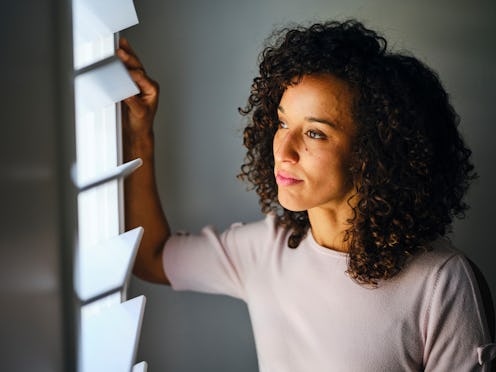Self
How To Deal With Second Wave Anxiety, According To Experts
The future seems very uncertain right now.

The UK lockdown, implemented to try and limit the spread of coronavirus, lasted for several months, and was an uncertain, frightening, and anxiety-inducing time. As we now emerge from the initial lockdown, concerns over a second wave of the virus, and thus, a second UK lockdown, are very real. The true likelihood of another country-wide quarantine is unclear, but there are ways to deal with anxiety about a second lockdown, if you’re really feeling uncertain and worried. I spoke to some experts to find out their best advice for how to manage your anxiety.
Unsurprisingly, levels of anxiety were higher than ever this year. "When the UK's lockdown started in late March and in early April, anxiety peaked, according to our research," says Catherine Seymour, Head of Research at the Mental Health Foundation. "At that point, nearly two-thirds of UK adults surveyed said they had felt anxious about the pandemic." And while Seymour explains that there is not enough research yet to determine what anxiety levels are like now relating to a second wave, she notes that the Foundation's "latest results do seem to suggest that the gentle fall in UK anxiety levels has stopped."
In fact, a study recently undertaken by CBD brand Kloris actually revealed that as the first lockdown began to wind down in June, 42% of British adults were feeling more anxious than they were at the start of lockdown.
Therefore, despite most of the UK beginning to ‘re-open,’ our concerns over our uncertain futures remain with us. So here's what the experts say about managing second lockdown anxiety.
1Set Up A Support Bubble
One of the best pieces of advice to follow is to ensure you are opening up to others during this scary time. "At times of stress, we work better in company and with support," says Seymour. "Try and keep in touch with your friends and family, by telephone, email or social media, or contact a helpline for emotional support." Try to remember that loved ones will understand now more than ever that things can be tough, and the best ones will be there to listen, without judgement.
2Seek Help From Professionals
While having a support system of friends and family you can talk to is important, you have to know when it's time to consult a professional. If you've been feeling very anxious, unhappy, and/or unwell for more than a couple of weeks, you should speak to your GP. Treatment-wise, it's about finding what works for you, says McLeod. "There are lots of treatments for stress, anxiety and depression and they don’t necessarily need to involve medication. Most people find it’s a mixture of things that work best." Talking Therapies such as CBT are offered on the NHS, but remember there may be a wait, so it's important to take care of yourself in other ways simultaneously.
3Be Mindful About Your News & Social Media Intake
This is a crucial one to follow, but something we may often forget. Seymour says: "Get your information about the coronavirus situation from reliable sources, such as the UK government, the NHS and the BBC. Rumour and speculation can fuel anxiety, whereas good quality information can help you feel more in control." She also adds that social media can affect you in ways you may not expect, so be sure to "tune in with yourself," and unfollow or mute any accounts or hashtags that are just making you more anxious.
4Look After Your Physical Wellbeing
One thing I've learnt over the years (after suffering with severe anxiety and OCD for nearly ten years) is how connected our bodies and minds are. While it's not a quick fix, taking care of your physical health can really benefit your mental strength and resilience. "There is evidence to suggest that exercise and physical activity can ease feelings of depression," says Kerry McLeod, Head of Information Content at mental health charity Mind. "Getting outdoors, ideally in nature, is great for our physical and mental health, so if you are able to exercise outside, this is even better." McLeod also reminds us that maintaining a healthy diet (with lots of fruit and veg, protein, hydration, and limited caffeine intake) can make a difference too in our overall wellbeing.
5Be Realistic & Kind To Yourself
At the end of the day, this is a hard time for all of us, and it's crucial not to be too hard on yourself if you have down days filled with anxiety. In fact, it's totally normal. Not only are we concerned about our health, we also have uncertainties such as job security and finances that may change if a second wave comes. McLeod's advice? "Try to acknowledge there are some things outside your control, and other things you can try to change for the better." And just cut yourself some slack, OK?!